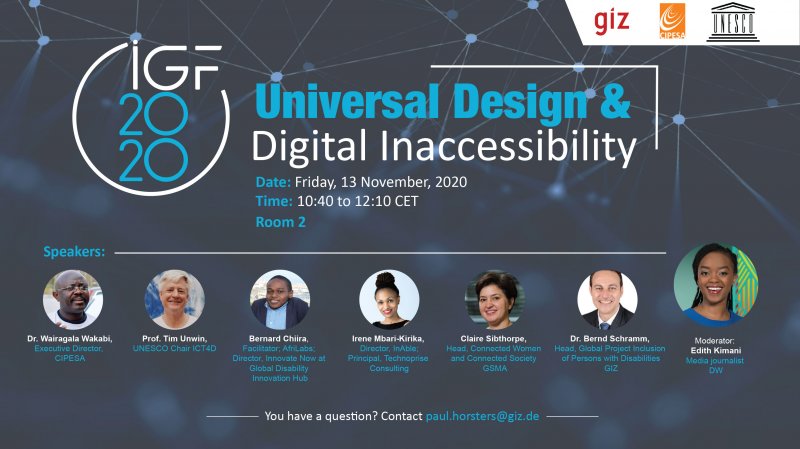IGF 2020 |
Accessibility and Universal Design are directly linked to the amplification of inequality and disadvantage of persons with disabilities through digital transformations. In order to leverage the potentials of Information and communications technology (ICT) for social inclusion, ways have to be identified to increase accessibility and beneficial usage by marginalized groups including people with disabilities.
Join the Internet Governance Forum (IGF) 2020 Session: Universal Design and Digital Inaccessibility
Despite the Convention on the Rights of People with Disabilities (CRPD) being one of the most ratified United Nations conventions in history, commitments in terms of improving ICT accessibility have oftentimes not been followed by concrete action. A collaborative effort of stakeholders is necessary to reshape the understanding of inclusion of persons with disabilities and their needs in technology design and thus improving usability and the leverage of “digital dividends” for everyone through joint action.
 Today, more and more aspects of political, social and economic life are being shifted to the online sphere where the societal exclusion of persons with disabilities is amplified. At the same time there is evidence that not only persons with disabilities but everyone could benefit if ICTs were designed inclusively. As part of the 2020 Internet Governance Forum, the Collaboration on International ICT Policy for East and Southern Africa (CIPESA) alongside speakers from the German Corporation for International Cooperation GmbH (GIZ), UNESCO, AfriLabs, InAble, the GSMA, and the German Ministry for Economic Cooperation and Development (BMZ) will participate in a session aimed at amplifying the social inequalities for persons with disabilities on Friday, 13 November, 2020 – 10:40 to 12:10 CET. See more about it here.
Today, more and more aspects of political, social and economic life are being shifted to the online sphere where the societal exclusion of persons with disabilities is amplified. At the same time there is evidence that not only persons with disabilities but everyone could benefit if ICTs were designed inclusively. As part of the 2020 Internet Governance Forum, the Collaboration on International ICT Policy for East and Southern Africa (CIPESA) alongside speakers from the German Corporation for International Cooperation GmbH (GIZ), UNESCO, AfriLabs, InAble, the GSMA, and the German Ministry for Economic Cooperation and Development (BMZ) will participate in a session aimed at amplifying the social inequalities for persons with disabilities on Friday, 13 November, 2020 – 10:40 to 12:10 CET. See more about it here.
This discussion echoes the findings of a CIPESA research report titled, Access Denied: How Telecom Operators in Africa are failing Persons with Disabilities which noted that even though the telecommunication industry plays a critical role in the provision of information and communication services to the public, it has continuously failed to meet the needs of persons with disabilities.
The research presents some notable initiatives and common challenges, and offers recommendations to telecom operators, disability rights organisations, and government agencies charged with protecting and promoting the rights of persons with disabilities.

It also observes that the benefits of creating products that are accessible to all extend not only to persons with disabilities but also to companies, by opening a new market opportunity for vendors among persons with disabilities. It further notes that the telecommunications industry needs to be proactive in creating and promoting awareness of accessible mobile communications among persons with disabilities, their caregivers, and organisations of persons with disabilities.
See the full report here.

